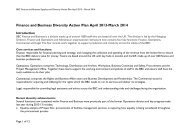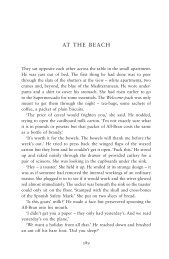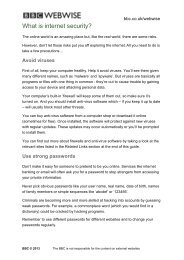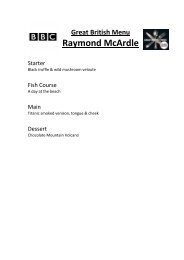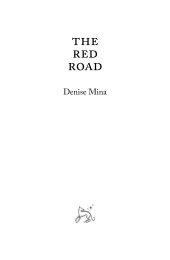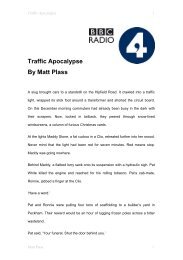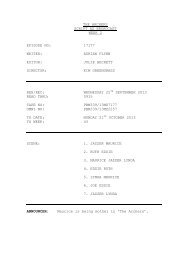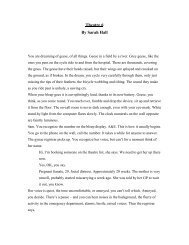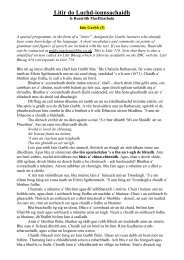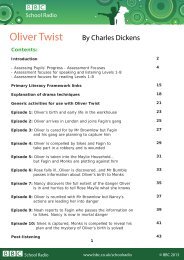Technical Specification: WAV & BWAV - BBC.com
Technical Specification: WAV & BWAV - BBC.com
Technical Specification: WAV & BWAV - BBC.com
Create successful ePaper yourself
Turn your PDF publications into a flip-book with our unique Google optimized e-Paper software.
<strong>Technical</strong> <strong>Specification</strong>: <strong>WAV</strong> & B<strong>WAV</strong><br />
This information covers the technical and format requirements for programme material delivered to<br />
<strong>BBC</strong> Radio as audio data files.<br />
Always refer to the <strong>com</strong>missioning network for more information, network specific requirements or to<br />
answer any questions.<br />
FILE FORMAT<br />
Audio files should be submitted in the RIFF/<strong>WAV</strong> format (.wav).<br />
See http://tech.ebu.ch/docs/tech/tech3285.pdf for details.<br />
If the audio file is programme material delivered for broadcast, then the audio format for the file will<br />
be: Linear PCM, 48 kHz, 16 Bit (or greater, by prior agreement)<br />
To reduce file size and so speed up file delivery over the Internet, the <strong>BBC</strong> will accept such wav files<br />
encoded to FLAC format (.flac).<br />
AUDIO PROPERTIES<br />
Levels<br />
For those using a correctly calibrated PPM the programme audio should peak up to PPM6 on A, B<br />
and/or M.<br />
If you are using a digital bar-graph meter regular readings of -10dBFS (10dB below absolute Full<br />
Scale or Maximum Coding) are desirable. Occasional transient readings above this are acceptable.<br />
Peak Normalisation should not be relied on to control programme levels.<br />
Audio Quality:<br />
Audio quality remains the producer's overall responsibility. The importance of consistent levels and<br />
overall quality cannot be over-stressed. Distortion, noise, induced hum etc. should not be audible.<br />
During the production process, audio should not be subjected to bit rate reduction (eg recording to a<br />
non-linear fomat)<br />
The recording should contain, where appropriate, the full transmittable audio bandwidth (20Hz to<br />
20kHz). Exceptions may be made; examples include archive material or material gathered necessarily<br />
under adverse conditions.<br />
Outside Broadcasts and remote contributions to programmes often necessarily use data reduction<br />
techniques, which degrade the sound quality. <strong>BBC</strong> Radio has produced a guide to help keep the<br />
degradation to a minimum:<br />
http://www.bbc.co.uk/guidelines/dq/pdf/radio/radio_delivery_contributions.pdf
Stereo:<br />
Stereo programmes must always be supplied as a single wav (or FLAC) file with the two channels<br />
recorded as A and B (ie. left and right) not as M and S (ie. sum and difference).<br />
Stereo programmes must be recorded so as to be <strong>com</strong>patible for listeners in mono. In general signals<br />
should be in phase between channels. The S (difference) signal should rarely exceed the M (sum)<br />
signal (otherwise cancellation can result when the signal is heard in mono). Avoid extremes of stereo<br />
imagery or “out of phase” effects as these present problems with mono <strong>com</strong>patibility.<br />
Tone.<br />
Radio 3 is the only radio network that requires tone. The tone should last for 30 seconds and should<br />
be on the end of the recording after one minute of silence.<br />
Reference tone, where used, should be at -18dBFS or PPM 4 on A, B and/or M.<br />
If submitting material with reference tone, tone and programme material must be have been monitored<br />
and measured through the same technical chain. The level of the tone must be equivalent to 0dBu and<br />
no less than 8dB below peak audio level for the programme material.<br />
THE LEVEL OF TONE MUST HAVE A KNOWN RELATIONSHIP WITH THE LEVEL OF THE<br />
PROGRAMME MATERIAL AND THIS MUST BE STATED; for example: “Tone at 8dB below<br />
peak programme level”.<br />
Important general technical notes follow ...<br />
Note on Sample Rate: Throughout 2013 all of <strong>BBC</strong> Radio will adopt 48kHz as the standard sample<br />
rate. It is desirable to record programmes at this sample rate.<br />
Note on Data Compression (a <strong>com</strong>mon term for bit rate reduction):<br />
Data Compression is usually destructive (“lossy”) and is best avoided. Examples include mp2, mp3,<br />
AAC and mp4<br />
The use of such lossy data <strong>com</strong>pression should be avoided wherever possible. Most solid state audio<br />
recorders (e.g. SD Card) offer a choice of recording formats, and linear should always be used in<br />
preference to any of the data <strong>com</strong>pressed formats.<br />
It is possible to apply lossless data <strong>com</strong>pression without <strong>com</strong>promising sound quality, using FLAC<br />
(Free Lossless Audio Codec).<br />
Take care when moving files between devices. Certain proprietary software may irrevocably damage<br />
your audio. Depending on the settings, the software may add data reduction techniques or Digital<br />
Rights Management (DRM), either of which could prevent your programme from being broadcast.<br />
Cascade (encoding):
This is where audio is subjected to more than one pass through a lossy data <strong>com</strong>pression<br />
encode/decode cycle. With each additional pass the audio quality is degraded, often to an<br />
unpredictable degree. Cascading is a serious issue for <strong>BBC</strong> Radio. The <strong>BBC</strong> uses lossy data<br />
<strong>com</strong>pression for its digital transmission systems (e.g. DAB, DSAT, DTT and Internet streaming). If<br />
lossy data <strong>com</strong>pression is also used during the production process it may interact, resulting in<br />
unsatisfactory audio quality as received by the listener.<br />
Even if the quality of <strong>com</strong>pressed audio sounds reasonable in the studio, it probably won't when the<br />
listeners hear it.




